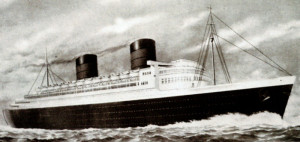
“Bless them all, bless them all, the long and the short and the tall…”
The song rang out across the Clyde as 17,000 soldiers and air servicemen approached the massive RMS Queen Elizabeth in tenders as we left Greenock harbour onjune 17 1942. As our tender drew nearer, the enormity of this vessel filled us with awe. The shore on the opposite side of the bay was obliterated by the size of the ship and the total darkness we were in. The blackout made everything seem evil and menacing. We lifted our heads higher and higher as we drew nearer to this vast ocean liner towering above us like a New York skyscraper, the largest ship in the world, 1,000ft. long and 118ft wide, 180ft high from keel to top forward funnel, with 14 decks and four propellers – all 85,000 magnificent gross tons ofher.
Although I was a Leading Aircraftsman in the RAF, the vast majority of troops were Army.
What a prize the Queen Elizabeth would have been to the German High Command as she sat out there in Greenock Bay…a Naval loss of enormous magnitude!
Within 24 hours we were steaming out of the bay escorted by several destroyers. Despite it being midsummer, the weather was atrocious. Destroyers bobbed about like corks with waves breaking over their bowrs, while the Queen Elizabeth ploughed her way through turbulent waters without a quiver.
By pre-arrangement the destroyers turned back once out in the Adantic. The Queen Elizabeth picked up speed to show the Navy her paces. We were now in the hunting grounds of the U-boats. Our protection was sheer speed and keeping a zig-zag course. If any U-boat commander set his periscope at our young Queen he soon found that, with her speed, the lady was not for taking.
When we arrived at Freetown, West Africa, there was relief at being away from the U-boats for a little while. Out there, though, maybe some commander was waiting, periscope up, licking fingers in eager anticipation as he sawr himself standing before Hitler receiving the Iron Cross, First Class.
When Table Mountain came into viewr we knewr the Queen had out-witted the U-boats. As she lay at anchor in the bay, the fairy lights of Cape Town glistened with the mountain in the background. The RAF on board prepared to disembark, leaving the Army contingent with a farewell salute.
We marched off through the suburbs of Cape Town in the early evening, with shops still open. Bright lights dazzled us, and there as little discipline in the marching as the attention of officers, NCOs and other ranks was drawn to the mouth-watering displays in the shops. There were bananas in large bunches, fat, juicy oranges and trusses of grapes waiting to be plucked. Such sights, which we hadn’t seen for three years, left us breathless.
Arriving at the basic camp ten or 12 hulking servicemen were squeezed into each tent. Toilet arrangements were primitive too, consisting of open air bucket latrines which had to be emptied by the unfortunate native African population. In the early hours of each morning you had to tread with caution, because spillage was common and the air was often filled with a rather unsavoury ‘perfume’.
Our six-week ‘holiday’ over, we left Cape Town to be introduced to General Rommel waiting for usjust outside Cairo.
Ken Chapman








